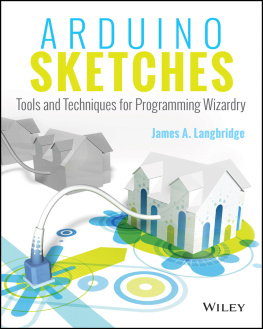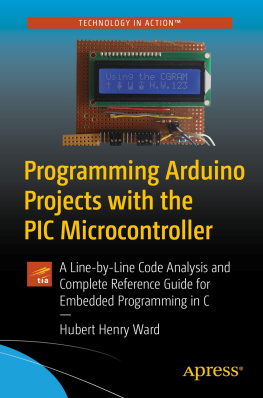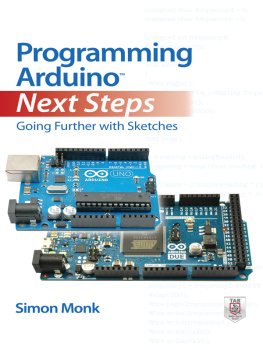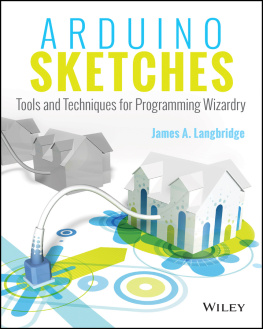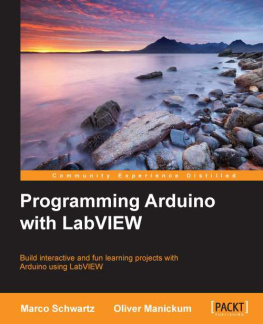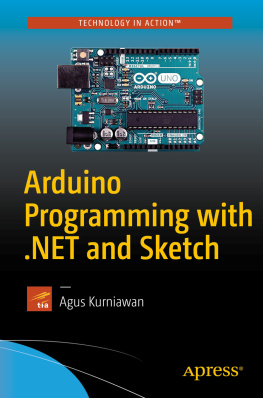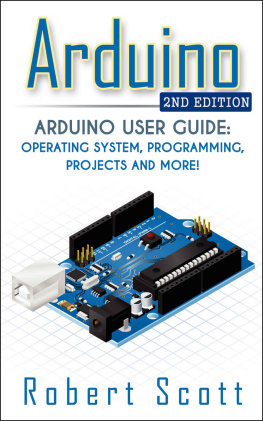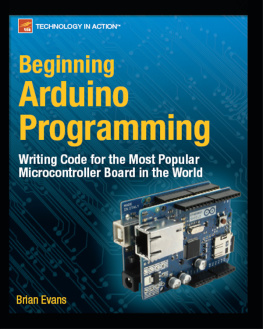
Arduino Sketches: Tools and Techniques for Programming Wizardry
Published by
John Wiley & Sons, Inc.
10475 Crosspoint Boulevard
Indianapolis, IN 46256
www.wiley.com
Copyright 2015 by John Wiley & Sons, Inc., Indianapolis, Indiana
Published simultaneously in Canada
ISBN: 978-1-118-91960-6
ISBN: 978-1-118-91962-0 (ebk)
ISBN: 978-1-118-91969-9 (ebk)
Manufactured in the United States of America
10 9 8 7 6 5 4 3 2 1
No part of this publication may be reproduced, stored in a retrieval system or transmitted in any form or by any means, electronic, mechanical, photocopying, recording, scanning or otherwise, except as permitted under Sections 107 or 108 of the 1976 United States Copyright Act, without either the prior written permission of the Publisher, or authorization through payment of the appropriate per-copy fee to the Copyright Clearance Center, 222 Rosewood Drive, Danvers, MA 01923, (978) 750-8400, fax (978) 646-8600. Requests to the Publisher for permission should be addressed to the Permissions Department, John Wiley & Sons, Inc., 111 River Street, Hoboken, NJ 07030, (201) 748-6011, fax (201) 748-6008, or online at http://www.wiley.com/go/permissions.
Limit of Liability/Disclaimer of Warranty: The publisher and the author make no representations or warranties with respect to the accuracy or completeness of the contents of this work and specifically disclaim all warranties, including without limitation warranties of fitness for a particular purpose. No warranty may be created or extended by sales or promotional materials. The advice and strategies contained herein may not be suitable for every situation. This work is sold with the understanding that the publisher is not engaged in rendering legal, accounting, or other professional services. If professional assistance is required, the services of a competent professional person should be sought. Neither the publisher nor the author shall be liable for damages arising herefrom. The fact that an organization or Web site is referred to in this work as a citation and/or a potential source of further information does not mean that the author or the publisher endorses the information the organization or website may provide or recommendations it may make. Further, readers should be aware that Internet websites listed in this work may have changed or disappeared between when this work was written and when it is read.
For general information on our other products and services please contact our Customer Care Department within the United States at (877) 762-2974, outside the United States at (317) 572-3993 or fax (317) 572-4002.
Wiley publishes in a variety of print and electronic formats and by print-on-demand. Some material included with standard print versions of this book may not be included in e-books or in print-on-demand. If this book refers to media such as a CD or DVD that is not included in the version you purchased, you may download this material at http://booksupport.wiley.com. For more information about Wiley products, visit www.wiley.com.
Library of Congress Control Number: 2014948616
Trademarks: Wiley and the Wiley logo are trademarks or registered trademarks of John Wiley & Sons, Inc. and/or its affiliates, in the United States and other countries, and may not be used without written permission. Arduino is a trademark of Arduino, LLC. All other trademarks are the property of their respective owners. John Wiley & Sons, Inc. is not associated with any product or vendor mentioned in this book.
To my loving girlfriend, Anne-Laure, who once again put up with entire evenings and weekends spent on my PC. This is the second time I've done that to her, but she put up with me anyway and kept on smiling (most of the time). I still don't know how.
To my wonderful daughter, Elna: I have to admit, I'm addicted to your laugh and smile, something you did every time I showed you the projects I was working on. Again you found a way of telling me when I needed to stop and spend more time playing with you (by unplugging and randomly rewiring my breadboard projects), but coming back home at the end of a long and difficult day to see you smiling and jumping into my arms gave me more energy than you can imagine.
About the Author
James A. Langbridge does not like talking about himself in the third person, but he will try anyway. James was born in Singapore and followed his parents to several countries before settling down in Nantes, France, where he lives with his partner and their daughter.
James is an embedded systems consultant and has worked for more than 15 years on industrial, military, mobile telephony, and aviation security systems. He works primarily on low-level development, creating bootloaders or optimizing routines in assembly, making the most of small processors. When not on contract, James trains engineers on embedded systems, or he makes new gizmos, much to the dismay of his partner.
James wrote his first computer program at age 6 and has never stopped tinkering since. He began using Apple IIs, ZX80s and ZX81s, and then moved to BBC Micros and the Amiga before finally having no other option but to use PCs.
About the Technical Editor
Scott Fitzgerald is an artist and educator working with technology and its relationship to people, approaching digital tools from a human-centric perspective. His work has been featured in numerous books and publications such as The New York Times and IDN Magazine. He has edited several books on Arduino and communication technologies, is the author of the book that accompanies the Arduino Starter Kit, and is responsible for documentation of the Arduino platform at http://arduino.cc. Scott is currently an assistant arts professor and head of the interactive media program at New York University Abu Dhabi. He enjoys tormenting his cat and partner with early morning work sessions.
Credits
Project Editor
Christina Haviland
Technical Proofreader
Ying Chin
Production Editor
Rebecca Anderson
Copy Editor
San Dee Phillips
Manager of Content Development and Assembly
Mary Beth Wakefield
Marketing Director
David Mayhew
Marketing Manager
Carrie Sherrill
Professional Technology and Strategy Director
Barry Pruett
Business Manager
Amy Knies
Associate Publisher
Jim Minatel
Project Coordinator, Cover
Patrick Redmond
Proofreader
Sarah Kaikini, Word One New York
Indexer
Johnna VanHoose Dinse
Cover Designer
Michael E. Trent/Wiley
Cover Image
iStock.com/johnbloor
Acknowledgments
Writing a book is a huge project. When I was at school, I used to shudder at the thought of writing 1,000 words for an essay, and I was alone to do it. This book is, of course, much longer, and I enjoyed every minute of it, thanks to the team of professionals who helped me every step of the way. Take a quick look at the people involved in this project, and you will soon see what I'm talking about.
I can't thank everyone involved personally; there are just too many people, but there are a few names that I will never forget. My thanks go out to Christina Haviland, my project editor. When I knew that I would be working with her again, I was thrilled. She actually managed to put up with me for the entire duration and didn't even shout at me when I was late, despite the fact that some of the chapters were very, very late. I was also thrilled to know that I'd be working with San Dee Phillips, my copy editor. The job they did transforming raw data coming out of my brain into something readable is outstanding. Then there is Scott Fitzgerald, my technical editor, who made sure that I didn't make any mistakes. Believe me, nothing slipped by, and despite all the grumbling I did when I received the corrections, thank you! This wouldn't have been possible without you.
Next page
